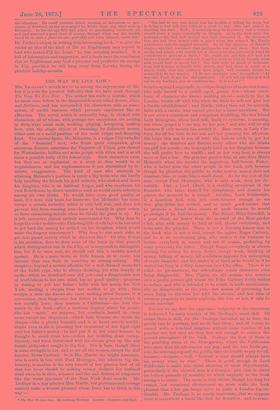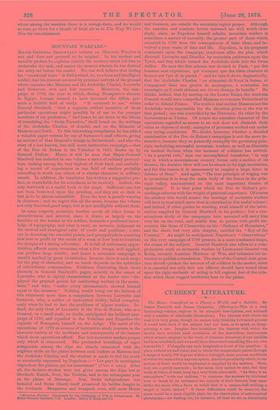THE WAY WE LIVE NOW.*
MR. TROLLOPE'S novels are to us among the enjoyments of life, but it is with the greatest difficulty that we have read through The Way We Live Now. The author has made a mistake, which he made once before in the disagreeable story called Brown, Jones, and Robinson, and has surrounded his characters with an atmo- sphere of sordid baseness which prevents enjoyment like an effluvium. The novel, which is unusually long, is choked with characters, all of whom, with perhaps two exceptions, are seeking in dirty ways mean ends, working, playing, intriguing, making love, with the single object of obtaining, by dishonest means, either cash or a social position of the most vulgar and flaunting kind. The central figure, Mr. Melmotte, is a vulgar City swindler of the "financial" sort, who floats great companies, gives enormous dinners, entertains the Emperor of China, gets elected for Westminster, bullies and seeks people with titles, and is at all times a possible bully of the lowest type. Such characters exist, but they are as unpleasant in a story as they would be as acquaintances, and the unpleasantness is not diminished by in- artistic exaggeration. The kind of man who succeeds in attaining Melmotte's position is rarely a big brute who can hardly help insulting the friends his gold collects, who shakes and beats his daughter, who is an habitual forger, and who overbears his own Boardroom by direct insolence such as would excite rebellion among his own clerks. He would have some good quality at least, if it were only brain for business; but Melmotte has none, except a certain audacity, which is only half real, and does not prevent him from wanting over-doses of brandy in great crises, or from committing suicide when he thinks the game is up. He is left, moreover, almost entirely unaccounted for. Why does he forge the order to deliverthe Pickering title-deeds before he has tried to get back the money he settled on his daughter, which would make the forgery unnecessary? Why does he run such risks to get into grand society which he does not like ? Or why, if that is his ambition, does he show none of the brain in that pursuit which distinguishes him in the City, or is supposed,to distinguish him, for if he were real, we should call him a muddle-headed upstart. He is a mere brute, so little human as to excite less interest than one feels in watching an ourang-outang. His daughter, beyond a certain affection for a well-dressed scoundrel of the feeble type, who is always drinking, yet wins heavily at cards—which no drunkard ever did yet—and a disagreeable sort of truthfulness to her own mind, has no good quality ; proposes in writing to rob her father ; bolts with her scamp for New York, stealing a cheque from her mother to go with ; then accepts a man she knows she cares nothing about because it is convenient, then flings over her father to keep money which is not morally hers ; then marries a Californian—the best cha- racter in the book—after a cautious inquiry about his means. She has "spirit," we suppose, but conducts herself in every scene except the elopement—which fails because she steals the cheque—like a plucky barmaid, and is at heart utterly sordid ; thinks even as she is planning her elopement of her legal right over her father's money—he had put it in her name because he thought he could trust her—orders her wedding dress surrep- titiously, and when threatened with the cheque gives up like any female pickpocket caught in the fact. She is base, though there is some strength in her, and so are all the women, except the dull heroine, Hetta Carbury. So is Mrs. Hurtle, the bright American, who is really in love with Paul Montague, but admires big dis- honesty, is anxious in the very tumult of her passion first of all that her lover should be making money, declares her husband .dead when he is alive, schemes and lies and dreams of vengeance like the worst specimen of the New York demi-monde. Mr. Trollope in a way admires Mrs. Hurtle, but prettiness and courage scarcely make a woman pleasant whose lover has to think in this way :— • The Way We Live Now. By Anthony Trollops. London: Chapman and Hall. " She had at any rate saved him the trouble of telling the story, but in doing so had left him without a word to say. She had owned to shooting the man. Well ; it certainly may be necessary that a woman should shoot a man—especially in Oregon. As to the duel with her husband,— she had half denied and half confessed it. He presumed that she had been armed with a pistol when she refused Mr. Hurtle admittance into the nuptial chamber. As to the question of Hurtle's death,—she had confessed that perhaps he was not dead. But then, as she had asked, why should not a divorce for the purpose in hand be considered as good as a death? He could not say that she had not washed herself clean ;—and yet, from the story as told by herself, what man would wish to marry her ? She had seen so much of drunken- ness, had become so handy with pistols, and bad done so much of a man's work, that any ordinary man might well hesitate before he assumed to be her master. ' I do not condemn you,' he replied.—' At any rate, Paul, do not lie,' she answered. 'If you tell me that you will not be my husband, you do condemn me. Is it not so?'" So is Georgiana Longestaffe, the vulgar daughter of an ancient house, who sells herself to a middle-aged, greasy Jew—whose excel- lence of character she knows nothing about—merely to live in London, breaks off with him when she finds he will not give her a double establishment ; and finally, rather than not be married, bolts with a curate, who cannot give her a house anywhere. She is not even a consistent and competent worldling, like her friend Lady Monogram, whose hard talk, frank to cynicism, is amusing, but whose gospel is "the way we live now," and who will do any baseness if only society has settled it. Base even is Lady Car- bury, for all her love to her son and her yearning for affection. She helps this son to run off with the heiress solely to get her money ; she deceives and flatters every editor who she thinks can puff her novels ; she is savagely hard on her daughter because she will prefer love to wealth ; and at her very best is always more or less a liar. She gets too good a fate, as also does Marie Melmotte when she marries the imperious, half-honest Fisker, who is better than the other people in the book, only because though he plunders the public to make money, money does not dominate him, or make him a small cheat. As for the rest of the men, except Paul Montague, who is only weak, they are de- testable. One, a Lord Alfred, is a crawling sycophant of the financier, who hates himself for sycophancy, and deserts his patron the moment he is ruined. Another, Lord Nidderdale, is a heartless fool, with just caste-honour enough to see that play-debts are settled, and so much good-nature that he protects a friend who cheats at cards because he would go straight if he had the money. The friend, Miles Grendall, is a poor cheat, no better than the steward of the Bear-garden Club, who with money to lend at call, cheats everybody, and bolts with the plunder. There is not a decently honest man in the book who is not a fool, except the squire, Roger Carbury, and he is an overbearing prig, who makes it his business to lecture everybody in season and out of season, preferring by some perversity the latter. Except Roger, everybody is always striving for money by every device except work, thinking of money, talking of money, till sordidness appears the mainspring of every character, and the reader is as tired as he would be if he waited too long in a dirty anteroom in a City office. There is no relief, no pleasantness, the subordinate comic characters even being disagreeable. Mrs. Pipkin, an old woman who watches over a pretty servant-girl whom Sir Felix Carbury feebly wishes to seduce, and who is intended to be comic, is made unintention- ally as disagreeable as the rest,—her notion of governing her niece being to threaten her with the streets, and her idea of virtuous propriety to marry anybody, like him or not, if only he means marriage.
Nor can we say that the oppressive vulgarity of the characters is redeemed by many touches of Mr. Trollope's usual skill. Of course there is skill, for Mr. Trollope intended us to hate the greedy race he portrays, and we do hate them ; and of course he cannot write a hundred chapters without some touches of his peculiar art, but they are very few, not enough to enliven the general atmosphere of the book. Perhaps the best of them is the gambling scene at the Bear-garden, where the Californian wins more than his adversaries can pay, and the two lords pre- sent, the nincompoop and the gorilla, take the trouble to pay for all, because,—because,—well, "because a man should always have his money when he wins." There is good enough in Lord Nidderdale to make him think cheating at cards objectionable, particularly if the cheated man is a stranger, and that is about the loftiest pinnacle of morality to which anybody in the book manages to attain. The scene is very clever, though too long for extract, but occasional clevernesses no more make the book pleasant than a few gas-lamps serve to make a London fog en- durable. Mr. Trollope is so rarely inaccurate, that we suppose there is somewhere a world like that he describes ; and so some-
where among the marshes there is a sewage-farm, and we would as soon go there for a breath of fresh air as to The Way We Live Now for entertainment.



































 Previous page
Previous page